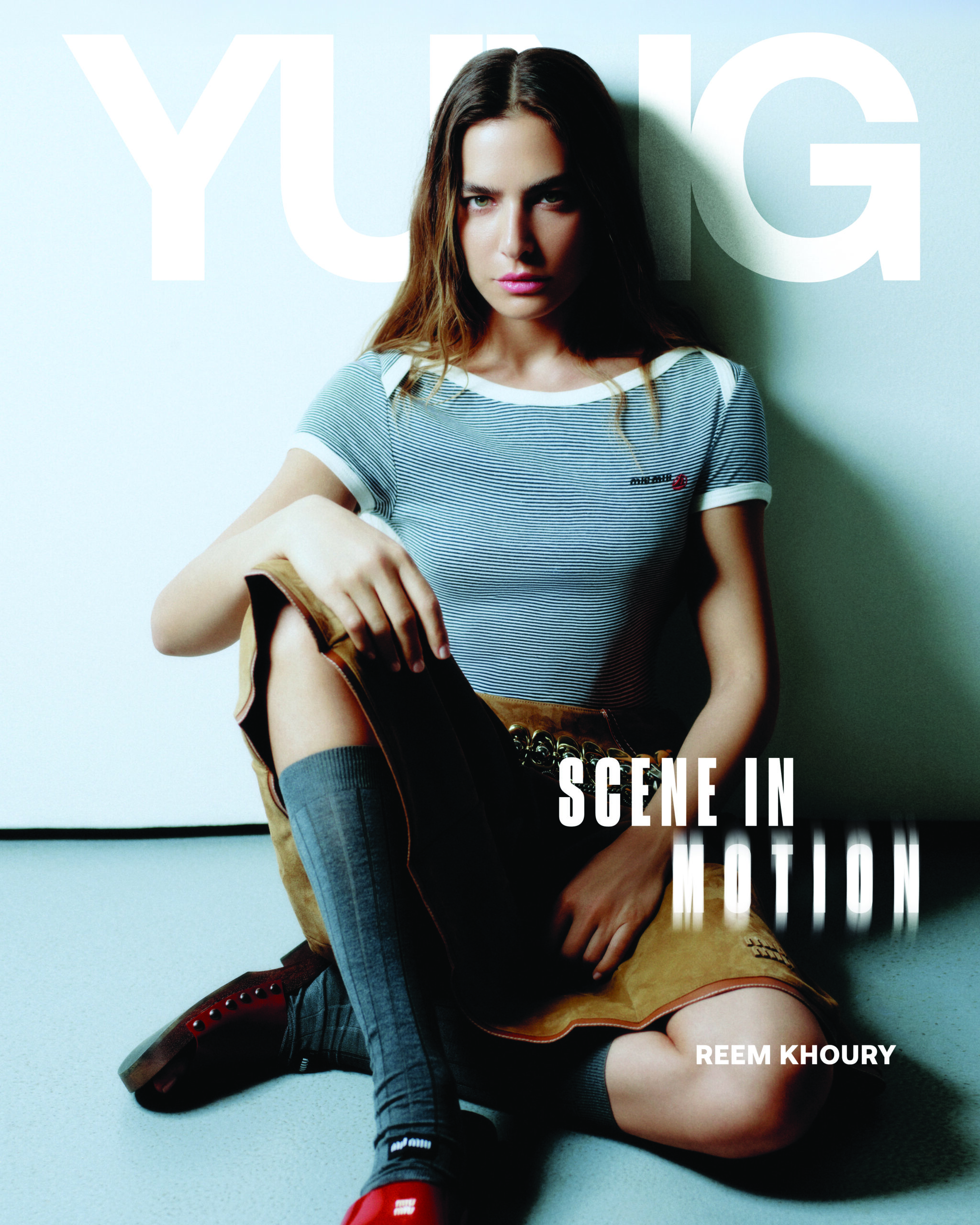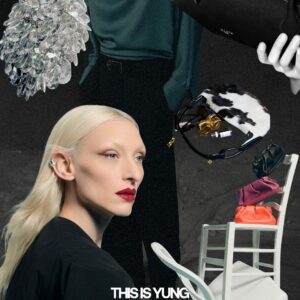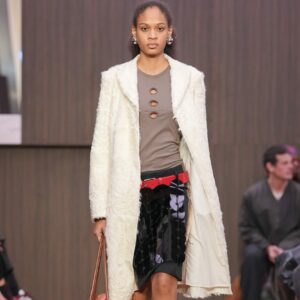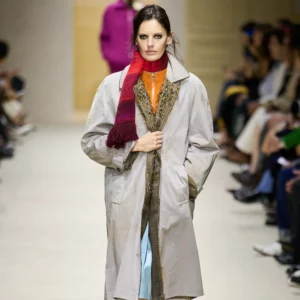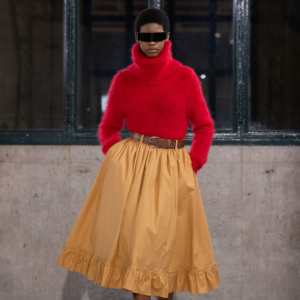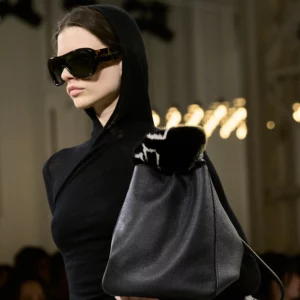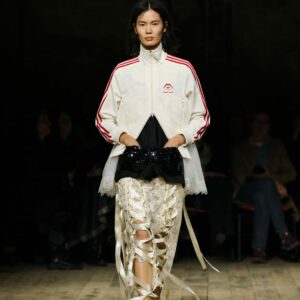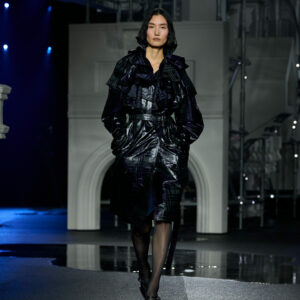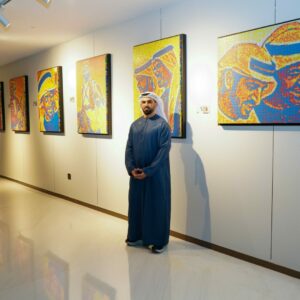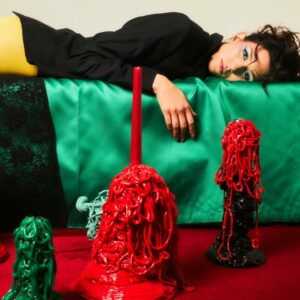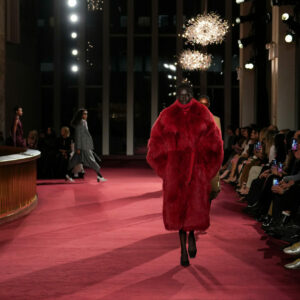In the bustling, vibrant heart of Beirut, where ancient history whispers through modern streets and artistic souls find their rhythm, a new voice is emerging. Reem Khoury (Instagram), the Lebanese actress quickly becoming a name to know, is charting a course distinctly her own, challenging conventions with every thoughtful word and compelling performance. Stepping into the spotlight after an unconventional journey from behind the camera, Khoury is changing what it means to be a leading woman in the Arab world, nuanced and authentic.
Our conversation with Reem Khoury unfolds with the candidness of an intimate chat between friends, revealing a woman deeply connected to her craft and fiercely protective of her individuality. It’s clear from the outset that her path to acting was anything but preordained. “I studied filmmaking at university,” she begins, a surprising revelation for an actress of her burgeoning stature. “We’ve always had short films to shoot, and my friends were always asking me to act in their short films.” What started as a casual favour soon blossomed into a profound realization. “It was the first moment I started acting,” she recalls, her voice tinged with a sense of epiphany.


For Khoury, acting offered a unique liberation – a chance to transcend the ordinary. “Because in life, sometimes you feel like, I wish I was a superhero. I wish I was a dancer, a singer,” she muses. “In acting, you get this opportunity. Even though you’re acting, but you’re doing it. You can live it. You can feel it. You can believe it. At least for the duration of the project, you’re living this life.” It’s this profound sense of immersion, of embodying myriad experiences, that truly drew her in.
Before the acting bug bit, Khoury’s early career provided an unexpected training ground: modelling. It’s a past that she credits significantly with shaping her ease in front of the lens. “First of all, it made me more comfortable in front of the camera,” she explains. “When I first started acting, I wasn’t aware of the camera. I forgot the camera. I just acted and was natural around it.” This early exposure instilled a rare naturalism that many seasoned actors strive for. “Because I didn’t study acting, but with the experience of being in front of the camera from modelling, it’s made me become a natural actor.” Beyond the gaze of the camera, modelling also refined her physical presence. “It helps my body language on camera,” she adds. “Some actors, you feel like they’re a bit stiff when they’re acting. So modelling gave me this flexibility of knowing how to move around the camera.”
Currently, Reem Khoury is making waves as Lara in the series Aser. Lara, she explains, “speaks whatever comes into her mind, even though sometimes it can get her into trouble.” She’s a character who “doesn’t think before acting,” a playful and glamorous “mafia girl” who uses her allure to help accomplish missions. The experience of working on Aser has been nothing short of a masterclass. “We have a variety of good, very, very well-known and class A actors like Basil Khayat, Abbas Al Nouri, Samer al-Masri,” she enthuses. “For me, it was like a school. Because I’m learning from them. I’m taking whatever notes they give me on how to improve myself. And sitting along them, sometimes behind the scenes, is very helpful.”

When asked about her most challenging roles, Khoury points to her experiences in Egypt. She was very nervous going in, unfamiliar with the industry’s workings, its acting and directing techniques, and what to expect. “Egyptians are people that improvise a lot” she explains. “If you’re an intruder like me, it’s hard for you to flow, to get with what they’re doing.” It forced her to adapt, to inject more of herself into the roles, to “do something from me, more than what’s written.”
Khoury’s journey has taken her from an aspiring filmmaker to a celebrated actress, yet her dream of directing remains very much alive. Her graduation short film, “The Tailor,” marked a pivotal moment. She was deeply inspired by European cinema, and her initial ambition for the film was to create it without actors. This challenging endeavour ultimately highlighted their indispensable value. Khoury realized the profound importance of actors in a film, understanding that even with a strong script and direction, an actor can elevate or diminish a project.
Her roots in Beirut are inextricably woven into her identity as an artist. The city’s resilience and its history of pain have become a profound source of inspiration. “Art sometimes comes from pain and sorrow. And Beirut has passed through a lot. And Lebanese people, we love our country… We’ve witnessed wars. We’ve witnessed one of the biggest explosions. We’ve lost people we love.” This deep connection to her homeland fuels her emotional depth, allowing her to draw on shared experiences of grief to enrich her performances.


Perhaps one of the most intriguing chapters in Khoury’s narrative is her participation in Miss Lebanon. She approaches the topic with refreshing honesty, acknowledging the unfortunate reality that “in Arab world, the actress, the main character, let’s say in drama, not in cinema, the main actress has to be beautiful.” For Reem Khoury, Miss Lebanon was a calculated decision, a means to an end. “I was at a point where I knew that becoming a director needs a lot of time and a lot of effort,” she explains. “And I wasn’t […] having the opportunity, the chances.” When the opportunity for Miss Lebanon presented itself, she seized it. The impact was immediate and undeniable. “I got a lot of calls for work the second day.”

Khoury is unapologetic about using the Miss Lebanon platform to advance her career. She openly asserts, “I used Miss Lebanon to work. I’m telling you, I used Miss Lebanon.” This frankness, however, comes with a caveat. Khoury expresses sadness that many talented actresses are overlooked due to a need to meet a certain standard of looks. This reality fuels her deep commitment to proving her worth through her talent. “I worked a lot on my acting career. And after that, I took a lot of workshops because I didn’t want people to say she’s acting because she’s not good enough.” Her goal is clear: to ensure that her acting prowess overshadows any superficial judgments. “I worked on myself to the point that people watch me and forget my looks. They just say she’s very adorable. She’s very natural on camera. This is what people like about me.”

Her artistic influences are as diverse as her ambitions. She gravitates towards European cinema, drawn to its raw, real, and actor-centric storytelling. Actresses like Uma Thurman, Jennifer Connelly, and Penelope Cruz inspire her, while directors such as Tarkovsky, Bernardo Bertolucci (a particular favourite), Lars von Trier, Gaspar Noé, Xavier Dolan, and David Lynch shape her cinematic vision. Among Arab directors, Ziad Dweiri and his film “West Beirut” hold a special place, a masterpiece that echoes with the universal themes of childhood and resilience amidst conflict.
Looking to the future, Reem Khoury envisions a legacy rooted in authenticity and artistic freedom. In an industry often bound by restrictive norms, particularly for women, she hopes to be remembered as “the girl that did whatever she wants freely.” She challenges the unwritten rules that dictate appearance and expression, especially the pervasive use of fillers and surgeries. “I want to be remembered as the girl who did whatever she wanted and spoke freely about what she loved. And not abiding by the rules just because she wants to reach [the heights]. No, she got there, but in her own way.” It’s a powerful statement of intent – to achieve success not by conforming, but by staying true to herself.
Reem Khoury navigates industry complexities with grace, intellect, unwavering commitment. Beirut inspires her; she embodies its spirit. A city refusing to be defined by its struggles. A woman, in every sense, unscripted. Unforgettable.

For more stories of art and culture, like this interview with Reem Khoury, visit our dedicated archives.
